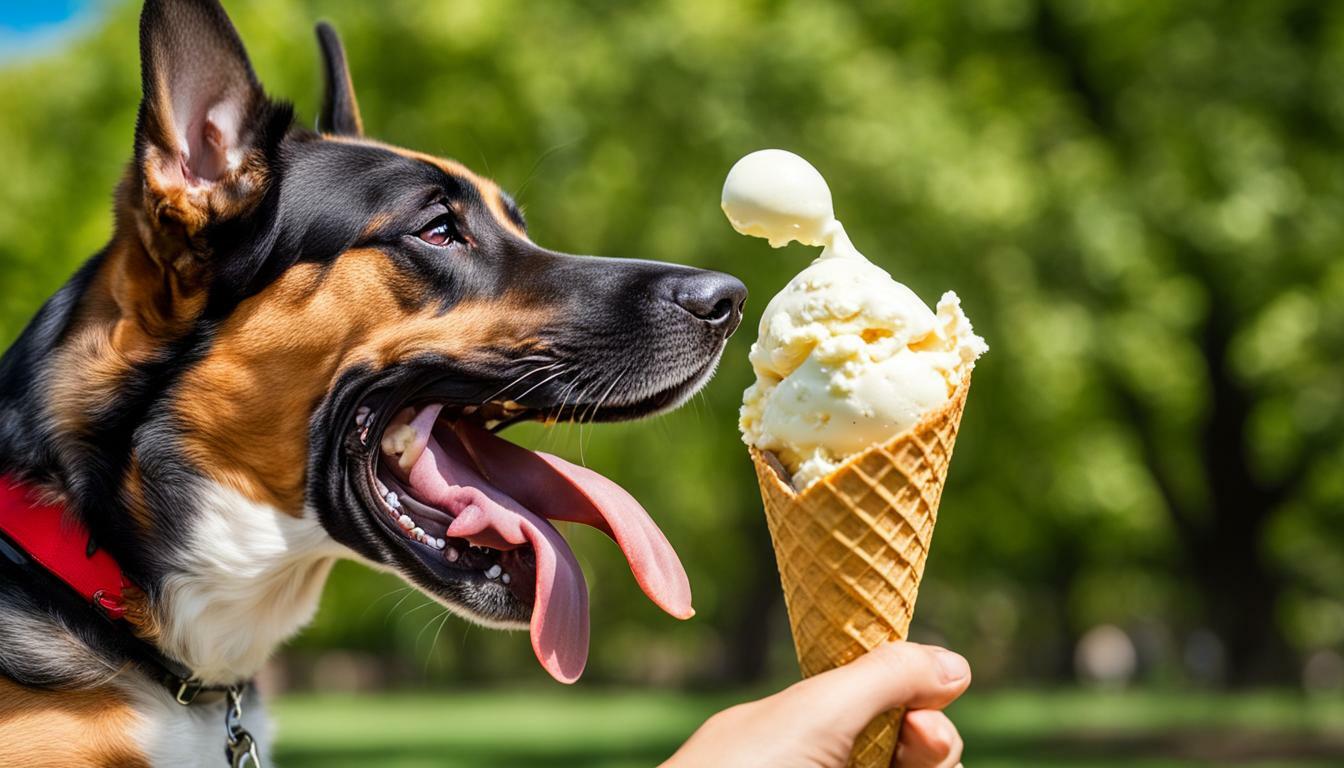
If you’ve ever wondered, “Can dogs eat vanilla?” it’s essential to understand how this popular flavoring can affect your beloved pet’s health and well-being.
While it may be tempting to share a spoonful of vanilla ice cream or custard with your dog, it’s best to avoid giving these treats to them. Dogs’ bodies are not designed to digest milk after they are weaned, so many adult dogs are lactose intolerant. Ice cream and custard can cause digestive problems, obesity, dental issues, and even pancreatitis in dogs. Some flavors of ice cream may also contain toxic ingredients like xylitol and chocolate. If your dog accidentally consumes a small amount of ice cream, monitor them for signs of illness and contact your vet if necessary.
Instead of ice cream, consider offering your dog dog-friendly treats like carrots, blueberries, or plain yogurt. There are also specially formulated dog ice creams available that are safe and nutritious for dogs to consume.
Key Takeaways:
- Vanilla ice cream and custard should be avoided as treats for dogs due to the potential digestive issues and risks associated with dairy consumption.
- Dogs can experience health problems such as obesity, dental issues, and pancreatitis from consuming ice cream and custard.
- Some flavors of ice cream may contain toxic ingredients like xylitol and chocolate, which can be harmful to dogs.
- Carrots, blueberries, and plain yogurt are safe alternatives to vanilla treats for dogs.
- Specially formulated dog ice creams provide a safe and nutritious option for dogs to enjoy a frozen treat.
The Benefits and Risks of Feeding Dogs Vanilla
While vanilla may be a common ingredient in many human desserts, it’s important to consider both the benefits and potential risks before offering it to your furry friend. Vanilla has a pleasant aroma and flavor that dogs may find enticing, but it’s crucial to ensure their safety and well-being.
One potential benefit of feeding dogs vanilla is its calming effect. The scent of vanilla has been known to have a soothing effect on both humans and animals. Some dog owners have reported that giving their dogs a small amount of vanilla extract or vanilla-flavored treats helps to alleviate anxiety or stress in certain situations, such as during thunderstorms or fireworks.
However, it’s essential to be aware of the potential risks associated with feeding dogs vanilla. One of the main concerns is the high sugar content found in many vanilla-flavored products. Excessive sugar intake can lead to weight gain, dental issues, and even diabetes in dogs. It’s crucial to monitor and limit your dog’s consumption of vanilla-flavored treats to prevent these problems.
Additionally, some vanilla extract products may contain alcohol, which can be toxic to dogs. Always check the ingredients list and opt for alcohol-free vanilla extracts or vanilla-flavored products specifically formulated for dogs. If you’re unsure about whether a particular vanilla product is safe for your dog, consult with your veterinarian for guidance.
Summary:
While vanilla may have a calming effect on dogs and can be enjoyed in moderation, it’s important to know the potential risks associated with its consumption. Excessive sugar intake and alcohol content in some products can lead to various health issues in dogs. Always prioritize your dog’s well-being and consult with your veterinarian before introducing any new food or treat into their diet.
Understanding the Risks of Vanilla-Flavored Treats
Although it may seem like a special treat for your canine companion, not all vanilla-flavored dog treats are safe or suitable for their consumption. While vanilla itself is generally considered safe for dogs in small amounts, it’s important to be cautious about the ingredients used in these treats.
Some commercially available vanilla-flavored dog treats may contain harmful additives, preservatives, or artificial sweeteners that can be toxic to dogs. For example, xylitol, a common sweetener in human foods, is highly toxic to dogs and can cause a rapid drop in blood sugar levels. Chocolate, another potential ingredient in these treats, contains theobromine, which is toxic to dogs and can lead to symptoms such as vomiting, diarrhea, rapid breathing, and even seizures.
To ensure the safety of your furry friend, it’s crucial to carefully read the ingredient labels of vanilla-flavored dog treats. Look for treats made with natural and wholesome ingredients, free of artificial additives and sweeteners. Better yet, consider making homemade vanilla dog treats using dog-friendly ingredients like oat flour, unsweetened applesauce, and a small amount of vanilla extract.
| Treat Brand | Ingredients | Suitable for Dogs? |
|---|---|---|
| Pawsome Treats | Whole wheat flour, sugar, vanilla flavoring | No |
| Healthy Paws | Oat flour, unsweetened applesauce, vanilla extract | Yes |
Remember, moderation is key when it comes to treating your dog. While a small taste of a safe and homemade vanilla treat can be a delightful indulgence for your furry friend, it should never replace a balanced and nutritious diet. If you have any concerns or questions about the suitability of vanilla-flavored treats for your dog, consult with your veterinarian for personalized advice.

Alternatives to Vanilla for Dogs
If you’re looking to provide your dog with a flavorful treat without the potential risks associated with vanilla, there are plenty of alternative options available. While vanilla may not be the best choice for our furry friends, there are other ingredients that can offer both taste and nutritional benefits.
One popular alternative is peanut butter, which many dogs absolutely love. Just make sure to choose a peanut butter product that does not contain xylitol, an artificial sweetener that can be toxic to dogs. You can spread a small amount of peanut butter on a dog-friendly biscuit or stuff it inside a puzzle toy to keep your pup entertained and satisfied.
Fruits like apples and bananas can also be a great choice for dogs. They are naturally sweet and packed with vitamins and fiber. Slice them into bite-sized pieces and offer them as a refreshing treat on a hot day or as a reward during training sessions.
Another option to consider is pumpkin. Not only is it delicious, but it also has numerous health benefits for dogs. Pumpkin is a good source of fiber, which aids in digestion, and it can also help regulate your dog’s bowel movements. You can serve it plain or mix it with a small amount of plain yogurt for an extra creamy treat.
| Treat Option | Advantages |
|---|---|
| Peanut Butter | Rich in flavor and loved by many dogs. Provides mental stimulation when used in puzzle toys. |
| Apples and Bananas | Naturally sweet and nutritious. High in vitamins and fiber. |
| Pumpkin | Packed with fiber and helps regulate digestion. Can be served plain or mixed with yogurt. |
Remember, when introducing any new treats into your dog’s diet, it’s important to do so gradually and in moderation. Always consult with your veterinarian to ensure the chosen alternatives are suitable for your dog’s specific dietary requirements. By offering these alternative options, you can provide your furry friend with a tasty and safe treat they’ll enjoy.

Conclusion
While vanilla may be safe for some dogs to consume in moderation, it’s crucial to consult with your veterinarian to ensure it aligns with your pet’s specific dietary needs and any health conditions they may have.
While it may be tempting to share a spoonful of vanilla ice cream or custard with your dog, it’s best to avoid giving these treats to them. Dogs’ bodies are not designed to digest milk after they are weaned, so many adult dogs are lactose intolerant. Ice cream and custard can cause digestive problems, obesity, dental issues, and even pancreatitis in dogs. Some flavors of ice cream may also contain toxic ingredients like xylitol and chocolate. If your dog accidentally consumes a small amount of ice cream, monitor them for signs of illness and contact your vet if necessary.
Instead of ice cream, consider offering your dog dog-friendly treats like carrots, blueberries, or plain yogurt. There are also specially formulated dog ice creams available that are safe and nutritious for dogs to consume.
If you do choose to give your dog vanilla-flavored treats, whether store-bought or homemade, be aware of the potential risks. Some ingredients used in vanilla-flavored treats, such as artificial sweeteners or excessive sugar, can be harmful to dogs. Always read the labels carefully and opt for treats made with natural and dog-friendly ingredients. It’s also important to remember that moderation is key when it comes to feeding your dog any type of treat, including those with vanilla flavoring.
In conclusion, while vanilla itself may not be toxic to dogs, it’s essential to consider the overall impact of vanilla-based treats on your pet’s health and well-being. Your veterinarian is the best source of guidance when it comes to determining what is safe and suitable for your dog’s diet. By prioritizing their dietary needs and consulting with a professional, you can ensure that your furry friend stays healthy and happy.
FAQ
Can dogs eat vanilla?
While it may be tempting to share a spoonful of vanilla ice cream or custard with your dog, it’s best to avoid giving these treats to them. Dogs’ bodies are not designed to digest milk after they are weaned, so many adult dogs are lactose intolerant. Vanilla is often found in ice cream and custard, which can cause digestive problems, obesity, dental issues, and even pancreatitis in dogs. Some flavors of ice cream may also contain toxic ingredients like xylitol and chocolate.
What are the risks of feeding dogs vanilla?
Feeding dogs vanilla can lead to digestive problems, obesity, dental issues, and pancreatitis. Additionally, some flavors of ice cream may contain toxic ingredients like xylitol and chocolate, which can be extremely harmful to dogs. It’s important to be cautious and avoid giving dogs vanilla or vanilla-flavored treats.
Are there alternatives to vanilla for dogs?
Yes, there are alternatives to vanilla that are safe and healthy for dogs to enjoy. Instead of vanilla-flavored treats, consider offering your dog dog-friendly options like carrots, blueberries, or plain yogurt. There are also specially formulated dog ice creams available that are safe and nutritious for dogs to consume.
Can homemade vanilla dog treats be harmful?
Yes, homemade vanilla dog treats can be harmful if they contain ingredients that are toxic to dogs, such as xylitol and chocolate. It’s important to be cautious when making homemade treats and to use dog-friendly ingredients that are safe for consumption.
How much vanilla can dogs eat?
It is best to avoid giving dogs any amount of vanilla, as their bodies are not designed to digest milk after they are weaned. Even small amounts of vanilla can cause digestive problems and other health issues in dogs. It’s always best to consult with your veterinarian for guidance on your dog’s specific dietary needs.






